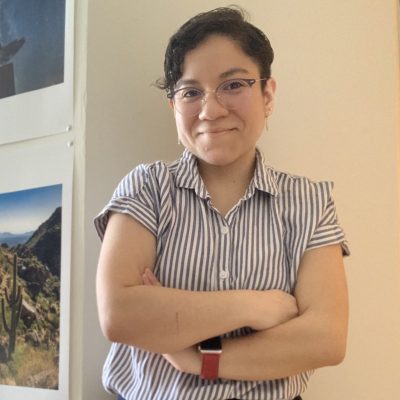Student Spotlight: Dory Peters

September 12, 2022
Dory Peters is a doctoral student in mechanical engineering from Nassau, Bahamas and Paterson, New Jersey. After studying physics and computer science at Montclair State University and physics and mathematics at Rutgers University, at Cornell she studies computational techniques that will increase computing capabilities.
What is your area of research and why is it important?
My proposed area of research is to develop new computational techniques that will increase computing capabilities by exploiting machine learning techniques. Traditional computational methods come with a high computational cost for active control, optimization, or uncertainty quantification problems. One can explore surrogates that significantly reduce computational cost. My focus will be on accelerating computations for highly deformable structures, soft robotics to human-computer interaction, and solid/fluid interactions in the subsurface environment. Ultimately, this study will expedite technological advances in various industry sectors that rely on next-generation computing.
What are the larger implications of this research?
For highly deforming structures and for multi-physics problems, the governing equations are often formed by partial differential equations (PDEs) that are difficult to solve analytically or can only be solved numerically, leading to high-dimensional solutions with increased computational costs. This study will promote growth in computational engineering by concentrating on physics-informed reduced order models (ROMs) while pushing the boundaries of machine learning techniques. Eventually, this study will extend to biological materials, enabling virtual twins used for health monitoring and assist towards topology optimization of orthopedic implants. Reducing computational costs would impact the accessibility and reliability of health-monitoring systems and customized orthopedic implants. As a person of color from a low-income community, this concentration alone will lessen health stressors in my own community.
What inspired you to choose this field of study?
A love of mathematics, physics, and coding has led me to the research topic in developing new computational techniques for multi-physics problems. While I thought I would pursue a Ph.D. in physics or applied mathematics, one of my biggest inspirations came from my very first advisor/mentor at Montclair State University, Ashwin Vaidya. He had a Ph.D in mechanical engineering while he taught physics courses and fluid mechanics research which opened the possibility of applying for mechanical engineering graduate programs. He became my window into exploring various fields and understanding their similarities.
What does it mean to you to have received a Ford Fellowship?
As a DACA recipient and first-generation student, it was during an REU at Caltech (in 2020) that my advisor Beverley McKeon said I should apply for a fellowship. I was ignorant to what a fellowship entailed/was, and she explained to me their reputations and merits. When I applied to Ford and began disclosing this accolade, I began understanding the impact it will make. Having been granted the Ford Fellowship, I am humbled and honored to have received it.
What are your hobbies or interests outside of your research or scholarship?
I have too many hobbies to list, mostly in the creative sectors around painting, crocheting, sculpting, drawing, and learning to play new instruments. But this year’s hobby is dedicated to continuing my love in physics by concentrating on my role as a scientist in the non-proliferation of nuclear weapons. In January 2022, I was accepted as a Next-Generation Fellow for APS’ The Coalition of Physicists for Nuclear Threat Reduction. Together with my mentor, Frank von Hippel (emeritus at Princeton), we have worked/are working on an article to be published titled, “The U.S. and European Union can stop imports of Russian uranium and enrichment services.” The paper is currently being edited but has been accepted to be published in the Bulletin of Atomic Scientists. This fellowship has allowed me to participate in the 10th review conference of the Parties to the Treaty on the Non-Proliferation of Nuclear Weapons (NPT) held at the UN in August 2022. Listening to voices from across the world from highly accredited individuals has ignited my passion for science policy and my active role in it. I hope to continue this hobby by participating in reducing the proliferation of nuclear weapons by either addressing government officials or through developed talks.
Why did you choose Cornell to pursue your degree?
Frankly, I applied to Cornell University only because my sister graduated with a degree in veterinary medicine from Cornell. So I was familiar with the school. But what led me to choose Cornell is that Cornell was the only school that was transparent on the funding surrounding DACA students and what were to happen if my DACA status was rescinded. There was a safety in the answers I received that I felt was not reciprocated at the other universities. Along with the friendliness and outreach from Nikolaos Bouklas and Nelly Andarawis-Puri (our DGS at MechE) and receiving the Dean’s Excellence Fellowship for 2021-2022 academic year, Cornell was an obvious choice to make.
